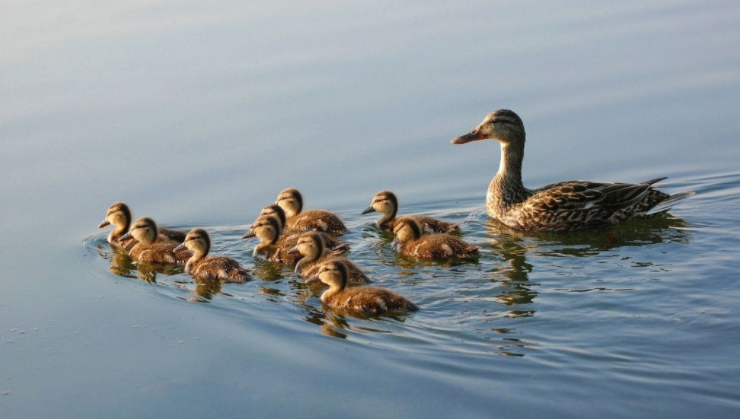

News briefing: The optimum environment temperature for the growth of meat duck is 16-22 °C, within this temperature range, the meat duck can give full play to its performance.
The optimum environment temperature for the growth of meat duck is 16-22 °C, within this temperature range, the meat duck can give full play to its performance. In summer, when the ambient temperature exceeds 28 °C, the meat duck is easy to have the heat stress reaction.
During heat stress, the ducks become agitated, drink more water, breathe more rapidly, open their mouths and wings, walk unsteadily, their feet become paralyzed, they die suddenly, they convulse before they die, they convulse, they become paralyzed after they die, their mouths become cyanotic, their noses and mouths become sticky, they become white and green, and their feathers fall off easily, anatomy: Muscle gray-white, such as semi-cooked, soft texture, liver, kidney and spleen swelling bleeding, heart coronary fat and abdominal fat punctate bleeding, intestinal swelling bleeding, intestinal mucosa off, trachea flush, Pulmonary Edema congestion. The fatter the duck, the more likely it is to die suddenly. High temperature can directly inhibit the excitability of the feeding center of Hypothalamus, and inhibit the vagus nerve of the digestive tract to slow down the peristalsis of the digestive tract, so that the digestive tract chyme is filled, thus leading to physiological dysfunction, decreased resistance and decreased food intake, the feed conversion became worse, which affected the normal growth and development. From the view of internal environment, high temperature can decrease the metabolic energy value and digestive enzyme activity of feed, decrease the digestibility and utilization ratio of some amino acids, and then the metabolic disorder of minerals, resulting in negative balance of calcium, magnesium, sodium and potassium plasma, at the same time, in order to increase heat dissipation, ducks will drink a lot of water, feces and urine excretion greatly increased, resulting in the loss of sodium, potassium and other micronutrient in the body loss, electrolyte imbalance, causing the body to supply obstacles, loss of water. It can even disrupt the balance of Gut microbes and cause harmful bacteria to proliferate. Because the damage of high temperature to poultry is irreversible, the prevention of heat stress is more important than treatment. Prevention and reduction of the occurrence of heat stress by focusing on the following measures:
1. Reasonable adjustment of breeding density. The summer weather is hot, ducks will increase heat dissipation, so control of breeding density is the basis of breeding operations. Simple shed density control in 6-8 per square, sealed shed control in 10-12 per square is appropriate. At the same time, attention should be paid to timely expansion of the group, to avoid the short-term density caused by excessive difficulty in management.
2. Ensure air flow, pay attention to shading cooling. Ventilation is the most important measure to reduce temperature and prevent heat stress. That is, through the air flow will shed hot and humid dirty air out of the shed, the shed outside the fresh and dry air into the shed. Whether through the fan or negative pressure fan curtain ventilation cooling through gas exchange to achieve the cooling effect, so maintain a certain amount of wind speed and ventilation shed is the most important summer heat management details. Direct sunlight is an important reason for excessive accumulated temperature of shed equipment in summer, especially for the West Wall of the north and south sheds. The area that is most exposed to direct sunlight throughout the summer can easily lead to regional excessive temperature, in this case, the use of shading nets or planting plants to block direct sunlight has a good cooling effect.
3. Ensure adequate supply and freshness of drinking water. During the hot season, the water consumption of ducks increases dramatically. Ducks not only reduce their body temperature by drinking more water, but also by frequently grooming their feathers to lower their body surface temperature. At high temperature, algae, biofilms and harmful microorganisms will grow in large numbers in the waterline. Duck long-term drinking dirty water will greatly increase the outbreak of E. coli, serositis, enteritis. Dirty water can also seriously reduce the effect of evaporation heat dissipation.
The drinking water temperature should be lower than 28 ° C. The water line should be cleaned once every 3 days. Four. Feed or drinking water in the appropriate supplement of VC and high-quality multi-vitamin. During high temperature weather, the oxidation and decomposition of vitamin components in feed are accelerated, and ducks drink more water, have vigorous metabolism, and lose vitamin and micronutrient seriously. In particular, VC and other vitamins in the hot season when the body's ability to reduce synthesis, in order to combat heat stress consumption will increase sharply. Therefore, it is necessary to supplement VC and high-quality compound vitamin in feed or drinking water to maintain body consumption and body fluid balance, and to improve the body;s ability to resist heat stress and disease.